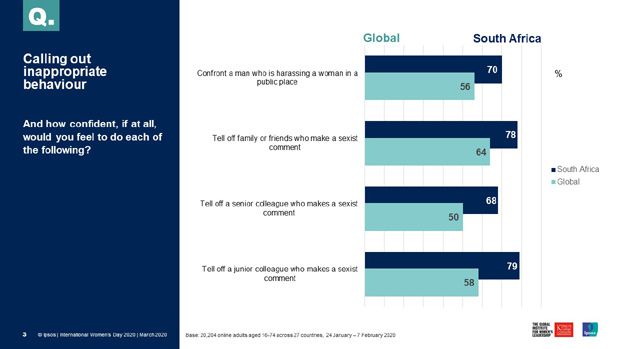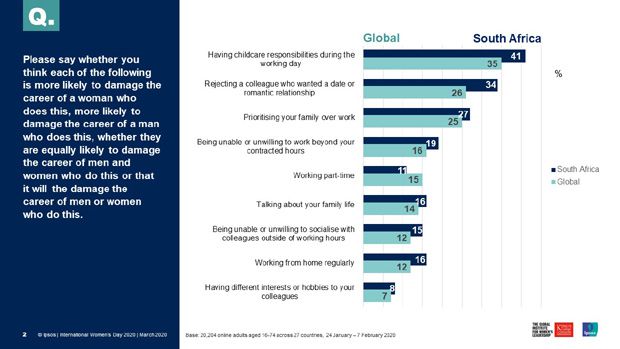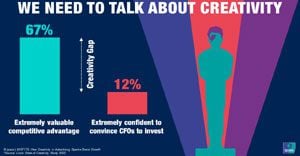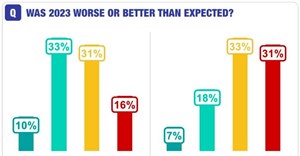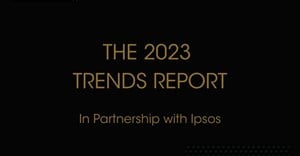
Close to 3 in 10 men say sexual jokes or stories at work are acceptable
The proportion of (online) men in South Africa who hold this view is below the global average. South African men are much less accepting of such behaviour – only 19% (or two in every ten) believe that its ok to tell sexual jokes at work - than their counterparts in countries including Japan, Great Britain, Germany and more.
11% of women in South Africa say such jokes or stories are acceptable and this is also lower than the global average of 16%.
The survey of over 20,000 people in 27 countries was carried out by Ipsos MORI in the UK and the Global Institute for Women’s Leadership at King’s College London. The study is conducted online and therefore only includes views of “connected” South Africans, which means that most are likely to be active in the workplace.
The survey reveals attitudes towards workplaces that many would regard as toxic or at the very least not female-friendly, which have been shown to hold women back in their careers.
It also finds significant differences in what women and men see as acceptable workplace behaviour, reveals where sexism is most likely to be challenged, and looks at whose careers are most likely to be affected by certain choices and responsibilities.
Julia Gillard, former Prime Minister and Chair of the Global Institute for Women’s Leadership, said: “The workplace is one of the most important battlegrounds in the fight for equality between women and men, and these findings show we still have some way to go. While those who help fuel toxic work environments are in the minority, it’s nonetheless a significant one – and their views can make people’s working lives a misery. If employers want to pay more than just lip service to gender equality, they need to invest in creating cultures that value diversity and inspire respect for all.”
What is acceptable at work?
Displaying sexual material
SA findings
- In South Africa, 8% of men think it’s acceptable to display material of a sexual nature at work, almost twice the 5% of women who say this is acceptable.
Global findings
- Globally, this rises to more than one in eight men (13%) who say displaying sexual content at work is acceptable, almost double the proportion of women (7%) who think the same.
- Men in China are by far the most likely to say this is OK, with nearly a third (32%) seeing it as acceptable. Nearly a quarter of women (23%) in India say the same – the most of any country polled.
Asking a colleague for a date even when they’ve said no
SA findings
- Men (11%) and women (5%) in South Africa are rather unlikely to say it’s acceptable to continue to ask a colleague for a date when they’ve already said no.
Global findings
- But around the world, a higher proportion – more than one in six men (15%) – say this is acceptable, compared with nearly one in 10 women (9%) who hold this view.
- People in Malaysia (29%) and India (26%) are most likely to think this is OK, while China has the biggest gender divide in opinion, with 30% of men saying it’s acceptable compared with 15% of women.
Asking a colleague for a date
SA findings
- Online South Africans (32%) are the second least likely to believe that asking a colleague for a date is acceptable. However, there is a marked gender divide in opinion: two in five (41%) men think asking a colleague for a date is acceptable, compared with not even a quarter of online women (23%).
Global findings
- Globally, 52% of men and 41% of women say it’s acceptable to ask a colleague for a date.
- Men (37%) and women (19%) in the US are least likely to think this is acceptable.
Who calls out inappropriate behaviour?
As one can see from the chart above, the opinions of online South Africans are above the global averages in terms of being willing to act against those that are behaving inappropriately.
- Most noticeably, online South Africans are second most likely in the world (68%) to say they would be confident to tell off a senior colleague for making a sexist comment. This rises to 79% when it comes to calling out a junior colleague.
- People in Sweden (69%), South Africa (68%) and Spain (63%) are most likely to say they would feel confident in telling off a senior colleague who makes a sexist comment, while people in Japan (31%), Poland (32%) and France (38%) are least likely.
- Of the 26 countries surveyed, South Africans, together with Britons feel most confident (68%) in telling off a family member or friend for making a sexist comment.
- In South Africa, men (78%) are more likely than women (62%) to say they would feel confident confronting a man who is harassing a woman in public.
- 71% of Russians say they would feel confident confronting a man who is harassing a woman in a public place, while at the other end of the spectrum, 29% of people in Japan and 31% of those in South Korea say the same.
What disproportionately harms women’s careers?
SA findings
People in South Africa think women’s careers are much more likely to be damaged than those of men because of certain choices or responsibilities.
- Most damaging, according to South Africans, is having childcare responsibilities during the workday – with 41% (6% higher than the global average) believing that this does damage to their careers.
- Nearly a third (34%) think rejecting a colleague who wanted a date or romantic relationship is more likely to damage the career of a woman.
- More than a quarter (27%) think a woman who talks about her family life at work is more likely to have her career harmed.
- Being unable or unwilling to socialise with colleagues outside of working hours is viewed as a career damaging move by 19% of South Africans.
Global findings
Globally, people predict less of a gender divide in the way such choices or responsibilities might harm a woman’s or a man’s career. However, for some issues, there remains a split:
- 26% say rejecting a colleague who wanted a date or romantic relationship is more likely to damage the career of a woman, compared with 7% who say a man’s career is more likely to harmed.
- 14% think a woman who talks about her family life is more likely to have her career harmed – more than twice as many as those who think a man’s career is more likely impacted for doing the same (6%).
- 25% think prioritising family over work is more likely to harm a woman’s career, while 9% think a man’s career is more likely to be harmed.
Mari Harris, Senior Client Officer at Ipsos, said: “International Women’s Day is a great reminder each year to think about where we are headed, and how far we have come, in the fight for gender equality.
“As South Africans, albeit only those with access to the internet, we can be proud to be at the bottom of the rankings in terms of tolerating inappropriate behaviour in the workplace and being at the top of the rankings when it comes to calling this behaviour out. Being an online survey, we can be confident that those participating are likely to be those who are active participants in the workplace itself and so the results are very positive from this point of view.
"It would be extremely interesting to test these attitudes and others about gender equality in the wider South African context, as our country is plagued by very high levels of Gender Based Violence.
"What is still concerning though is that we are above the global average in thinking that certain behaviours are career limiting for women more so than for men. Equality won’t happen until these beliefs are challenged and changed.”
Technical details
These are the findings of a survey conducted in 27 countries via Global Advisor, the online survey platform of Ipsos, between 24 January - 7 February 2020.
For this survey, Ipsos interviewed a total of 20,204 adults aged:
- 16-74 in Argentina, Australia, Belgium, Brazil, Chile, China, France, Germany, Great Britain, Hungary, India, Italy, Japan, Malaysia, Mexico, Netherlands, Peru, Poland, Russia, Saudi Arabia, Spain, and Sweden;
- 18-74 in South Africa, Canada, Turkey, and the United States of America;
- 19-74 in South Korea.
The sample consists of 1,000+ individuals in each of Australia, Brazil, Canada, China, France, Germany, Great Britain, Italy, Japan, Spain, and the US, and of 500+ individuals in each of the other countries surveyed. The data is weighted so each country’s sample composition best reflects the demographic profile of its adult population according to the most recent census data, and to give each country an equal weight in the total “global” sample.
Online surveys can be taken as representative of the general working-age population in Argentina, Australia, Belgium, Canada, France, Germany, Great Britain, Hungary, Italy, Japan, Netherlands, Poland, South Korea, Spain, Sweden, and the United States. Online samples in other countries surveyed are more urban, more educated and/or more affluent than the general population and the results should be viewed as reflecting the views of a more “connected” population.
Sample surveys and polls may be subject to other sources of error, including, but not limited to coverage error, and measurement error. The precision of online surveys conducted on Global Advisor is measured using a Bayesian Credibility Interval. Here, the poll has a credibility interval of +/-3.5 percentage points for countries where the sample is 1,000+ and +/- 4.8 points for countries where the sample is 500+. For more information on the Ipsos use of credibility intervals, please go to https://www.ipsos.com/sites/default/files/2017-03/IpsosPA_CredibilityIntervals.pdf.
Mari Harris
Senior Client Officer
Ipsos South Africa
moc.sospi@sirrah.iram
Ezethu Mandlelize
Service Line Manager, Public Affairs
moc.sospi@ezileldnam.uhteze


- Unlocking the value of creativity in advertising: How to bridge the creativity gap15 Apr 13:47
- 4 habits keeping your brand poor26 Mar 16:08
- Understanding consumer mindsets for growth in 202407 Mar 08:52
- South Africa's unemployment nightmare: The burden on its people09 May 10:05
- Global survey shows shrinking trust in internet29 Nov 10:17











